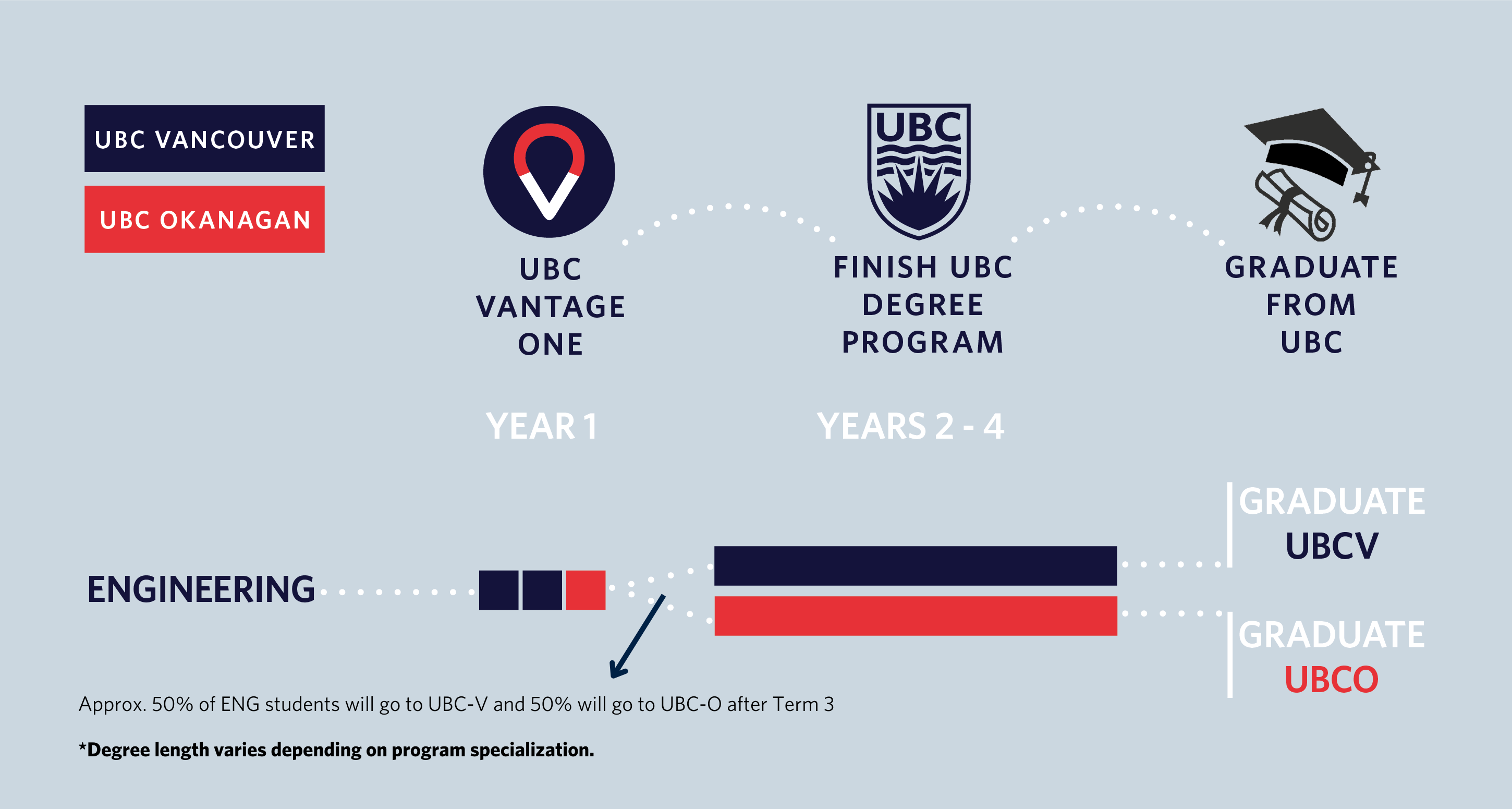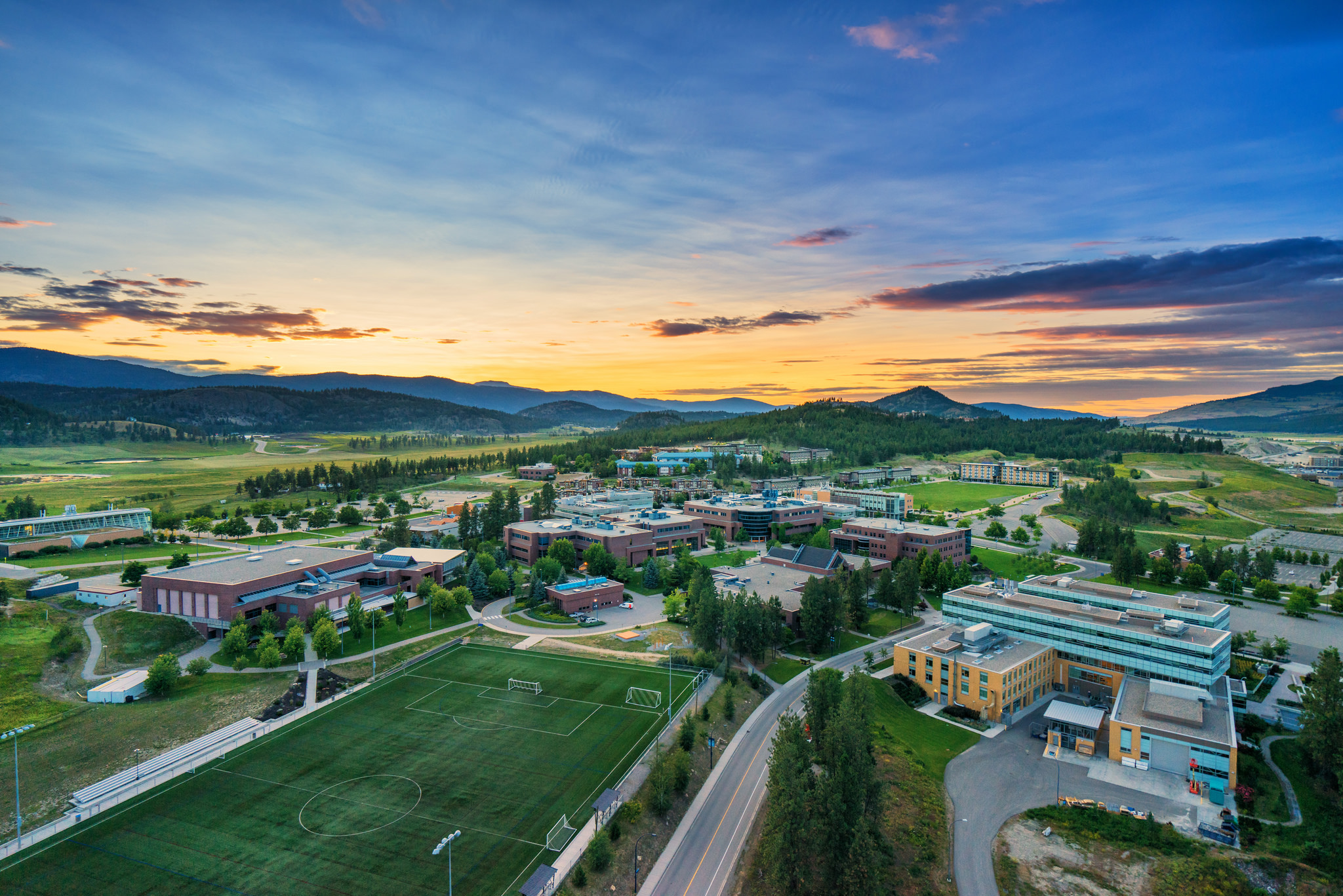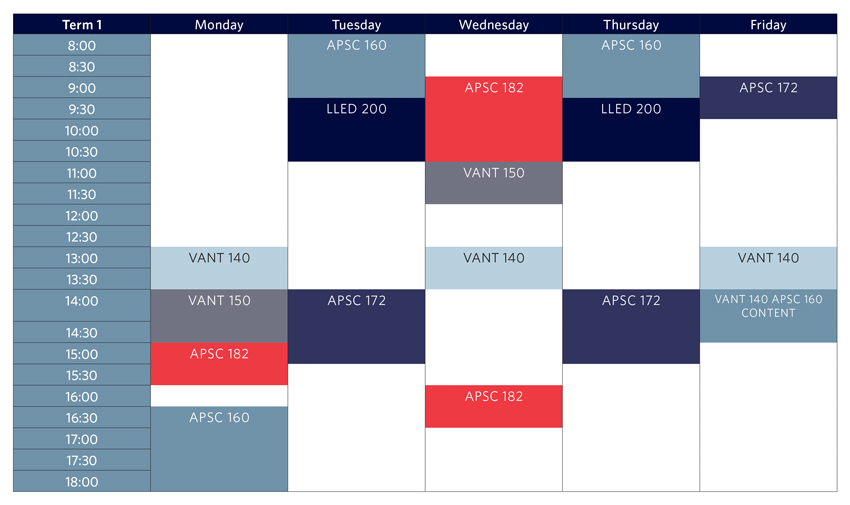Vantage One Engineering
(Bachelor of Applied Science degree program)
By starting your UBC degree in Applied Science in the Vantage One Engineering program, you will gain a strong foundation of core knowledge in engineering, while also developing your English language skills. You will also have the opportunity to work in teams and learn through critical analysis and research. Coursework ranges from sustainability and engineering, to matter and energy, and computation in engineering design, with Term 3 of the program taught at the picturesque UBC Okanagan campus.

Eligible Second Year Programs
Okanagan Campus: Civil, Electrical, Manufacturing, and Mechanical Engineering.
Vancouver Campus: Biomedical, Chemical, Chemical and Biological, Civil, Computer, Electrical, Engineering Physics, Environmental*, Environmental (UNBC)**, Geological, Integrated, Manufacturing, Materials, Mechanical, and Mining Engineering.
*UBC offers two Environmental Engineering Programs, one is entirely at UBC's Vancouver campus and the other is jointly offered by the University of Northern British Columbia (Prince George) and UBC's Vancouver campus. To find out more about the difference between the two programs, please click here for more information.
**If you are interested in the joint Environmental Engineering specialization with UNBC, you will be required to apply as a transfer student to UNBC in second year, and relocate to Prince George, BC, for at least two years. Please click here for more information, or email Vantage College's Engineering Academic Advisor, tina.chan@ubc.ca.
Dual Campus Experience

All Vantage One Engineering students complete Term 1 and Term 2 at UBC's Vancouver campus. During Term 3 (May to July), Engineering students study at UBC's Okanagan campus in Kelowna, BC. Upon successful completion of the Vantage One Engineering program, you will progress into second year and finish your Bachelor of Applied Science at either UBC Vancouver or UBC Okanagan. Approximately 50% of Engineering students will go to UBC-V and 50% will go to UBC-O after Term 3, depending on your major and academic performance.
Additional Program Details
The Faculty has reserved space for all UBC Vantage College Engineering Stream students to be able to transition to a second year program. Half of the reserved spaces are located at the Okanagan campus, and the other half are located at the Vancouver campus.
UBC Vantage College students in the Engineering program who pass all courses and have achieved an average of 60% will be eligible for year two of the BASc degree program.
Program selection is competitive, and all students will be asked to rank both their preferred campus and their eligible program. Both academic performance and a personal statement are considered in placing students into programs in second year.
Students who do not successfully complete the full UBC Vantage College Engineering program or who achieve an average lower than 60% in the full program will be reviewed on a case-by-case basis for evidence of academic promise for continued study in Engineering at UBC.
Upon successful completion of the UBC Vantage One Engineering program, students will be eligible for second year standing. Additional program requirements (humanities elective or APSC 181, depending on program) that are normally completed in first year will not have been met and must also be completed prior to graduation.
Students transferring into the second year of the Biomedical Engineering program who have not completed all required first year BME courses may be required to complete additional first year course work during second year.
Courses
Between September and July, you will be registered in the following courses:
APSC 160 (3)
Introduction to Computation in Engineering Design
Analysis and simulation, laboratory data acquisition and processing, measurement interfaces, engineering tools, computer systems organization, programming languages.
APSC 176 (3)
Engineering Communication
Purpose, audience, content, format, and tone are studied, as are team-based report writings and presentations. Community Service Learning projects are integrated into existing assignments.
APSC 172 (3)
Engineering Analysis I
Functions, limits, differentiation, applications of derivatives, integration, applications of definite integrals.
APSC 173 (3)
Engineering Analysis II
Integrals and transcendental functions, techniques of integration, applications of integration, polar coordinates, infinite sequences and series, vectors and the geometry of space, and partial derivatives.
APSC 178 (4)
Electricity, Magnetism, and Waves
Coulomb's law, electric field, Gauss' law, electric potential, conductors, capacitance, electric currents, resistance, DC circuits, magnetic fields and forces, sources of magnetic fields, electromagnetic induction, mechanical waves, electromagnetic waves, light propagation, geometrical optics.
APSC 179 (3)
Linear Algebra for Engineers
Systems of linear equations, Gaussian elimination, engineering application of linear algebra, matrix operations, special matrices, determinants, vector space, orthogonality, eigenvalues and eigenvectors, linear transformation.
APSC 180 (3)
Statics
Force vectors, Cartesian coordinate system, free body diagram, dot and cross products, forces equilibrium of particles, force and moment equilibrium of rigid bodies, analysis of trusses, frames and machines, friction, wedges, pulleys, and belts. Applications of linear algebra in statics.
APSC 182 (3)
Matter and Energy I
Thermometry, states of matter and phase change, ideal and real gases, 1st law of thermodynamics, 2nd law of thermodynamics, liquids, solutions.
APSC 183 (3)
Matter and Energy II
Atomic structures and bonding, solid crystals, chemical equilibrium, reactions in gas phase and in aqueous solutions, acid-base and redox reactions, kinetics of chemical reactions, thermochemistry, electrochemistry.
LLED 200 (3)
Introduction to Writing in Academic and Professional Registers
Examination of sociolinguistic knowledge and skills that are central to the production of academic and professional texts.
LLED 201 (3)
Critical Reading and Writing in Academic and Professional Registers
In this course, the heightened awareness of effective academic writing gained in LLED 200 is applied to a small research project that students design, implement and report on. Students receive explicit, critically-framed instruction in reading and writing academic reports, and individualized feedback on the draft sections of their research paper, including a research proposal.
VANT 140 (4)
Content and Language Enrichment Tutorials
Sustained language support for linked content courses in the Vantage One Program. Students develop strategies for self-directed learning.
VANT 150 (3)
Sustainability and Engineering Design
Topics in sustainability, including the impact of technology on the environment and society, and fundamentals of engineering design.
VANT 151 (3)
Multidisciplinary Engineering Design Project
Design project that culminates in student-led project fair.
Vantage One Applied Science Course Table
| Term 1 (UBCV) | Term 2 (UBCV) | Summer Term (UBCO) |
|---|---|---|
| APSC 160 (3) APSC 172 (3) APSC 182 (3) LLED 200 (3) | APSC 173 (3) APSC 178 (4) APSC 183 (3) LLED 201 (3) | APSC 176 (3) APSC 179 (3) APSC 180 (3) |
| VANT 150 (3) VANT 140 (4) | VANT 151 (3) | |
Example Weekly Schedule

